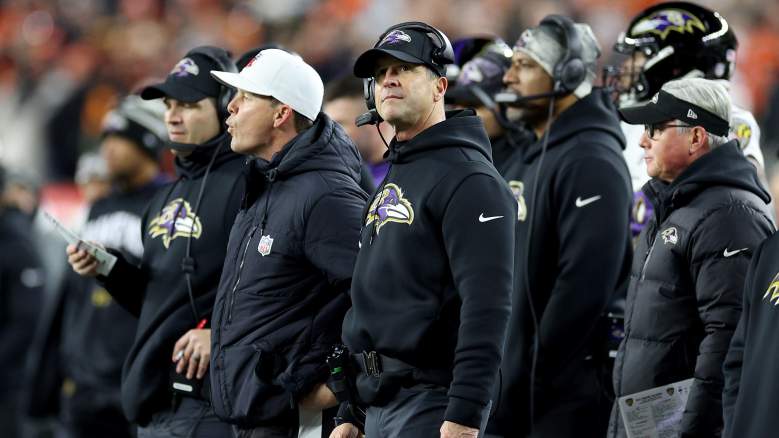
John Harbaugh defended how the Baltimore Ravens managed the clock during their 24-17 loss to the Cincinnati Bengals in the Wild Card Playoffs on Sunday, January 15. Specifically, the head coach thought the Ravens were right not to use their timeouts outside of the red zone on the other side of the two-minute warning.
It was a controversial strategy, especially since the Ravens were well-placed to score a game-tying touchdown. Instead, huddling up twice allowed many precious seconds to run off the clock and leave backup quarterback Tyler Huntley with little choice but to heave a few desperation passes into the end zone.
Harbaugh was defiant afterwards, insisting a holding penalty against right guard Kevin Zeitler was actually more damaging than any decisions he and his staff made about the clock. What the Ravens’ clock-management actually showed was a curious lack of faith in their defense, as well as a willingness to put too much on Huntley’s shoulders.
John Harbaugh Showed Lack of Faith in Defense
Obviously keen to head off inevitable criticism, Harbaugh spared few words explaining why he kept timeouts in his pocket, per ESPN’s Jamison Hensley: “The idea there was to save the timeouts for the red zone. I think the thing that killed us was the holding penalty, which knocked us back. The idea was, ‘We’ve got time.’ We want to keep those timeouts to throw the ball. So, we tried to pop a run there; we’re going to call a timeout after that. Then, we still have run-pass options. … We wanted to score without giving the ball back. We think we’re going to be in the red zone; we think it’s going to be just a certain number of plays and it’s going to work right down to the end of the game rather than maybe you score with 30-35 seconds, (and) you give them a chance to go kick a field goal at the end. So, I think we played it right.”
Despite the detail he provided, it’s difficult to accept Harbaugh’s reasoning as valid. There’s obviously a risk to giving Bengals’ quarterback Joe Burrow enough time to manufacture a score, but the Ravens had kept the star signal-caller and his receivers firmly under wraps during the fourth quarter.
Harbaugh could have trusted his defense to preserve the stalemate long enough for the Ravens to force overtime. This was the opposite of when Harbaugh tried to protect his defense earlier in the season.
The Ravens botched a similar situation when they went for a touchdown on 4th-and-goal, rather than kicking a go-ahead field goal against the Buffalo Bills in Week 4. Harbaugh’s call resulted in Lamar Jackson being intercepted by safety Jordan Poyer, allowing Josh Allen and his offense to instead drive for the game-winning kick.
Harbaugh defended the call by saying he wanted to avoid “putting your defense at a disadvantage.”
There was a strange dichotomy about these comments. For one thing, Harbaugh appeared to trust his defense only if the Bills needed more than three points and had field position working against them. A coach apparently “very confident” in his defense would surely back the unit in multiple situations.
Harbaugh’s reasoning went against the Ravens and perhaps motivated the decision to try and protect the defense again against Burrow.
Taking timeouts against the Bengals would also have helped Huntley, subbing once again for the injured Lamar Jackson, control the tension and high stakes of the moment. Driving to beat both the Bengal’s defense and the clock increased the pressure on a QB making just the ninth start in his pro career and first in the postseason.
End-of-game situations like this are fast, frenetic, intense and messy. Many coaches and players can handle those things, but a backup dealing with playoff pressure deserved more time to collect himself. Harbaugh clearly expected Huntley to master the moment without any help.
The coach had already placed the blame on Huntley for the failed QB sneak that led to a fumble and Sam Hubbard’s 98-yard, game-winning return for a touchdown.
Harbaugh Scapegoated Tyler Huntley
Rather than make the decisive gaffe a team failure, Harbaugh singled out Huntley for not executing the call in the right way, per Ravens Vault co-host Sarah Ellison:
As Ellison noted, Harbs didn’t want to go into detail about why he didn’t have offensive coordinator Greg Roman call the number of running backs Gus Edwards or J.K. Dobbins.
It was a similar situation in the game’s final moments, when the Ravens used tight end Mark Andrews as a wide receiver, instead of trusting the natural wideouts on their roster. Former Ravens’ defensive end Marcus Spears was less than impressed by the play-calling:
The personnel groupings were questionable, but Andrew is an All-pro who had already burned the Bengals for five catches and 73 yards. It makes sense for any team to look for its most consistent playmaker with the game on the line.
What makes less sense is how the Ravens denied themselves enough time to find the right play for Andrews. Enough time to still call some runs and give Huntley and his receivers manageable down-and-distance situations from which to strike.
Ultimately, Harbaugh’s game-management decisions defined the Ravens’ season for the wrong reasons. Those decisions are always dissected with the benefit of hindsight, but coaches are paid to get them right more often than not.
Comments
John Harbaugh Explains Ravens’ Clock Management vs. Bengals